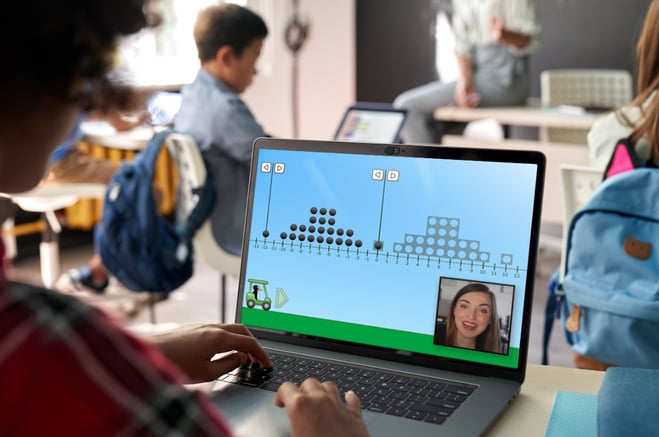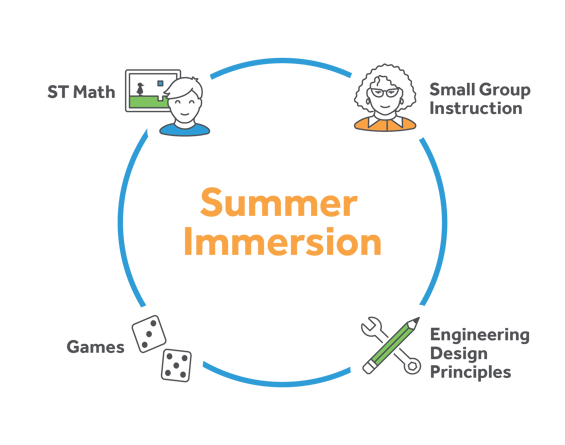
Expanded Learning Opportunities and Ways to Extend Your Reach with ST Math
The question on a lot of our minds these days is: How do we make up for interrupted learning?
When thinking about how to accelerate math achievement back to pre-pandemic levels, there are many ways to provide your students with additional instructional time outside of the classroom. Learning doesn’t need to be confined to just the school day or even the school year.
Though the focus here will be how to integrate ST Math into your expanded learning program, the extra time outside the classroom can be used for the development of additional skills, such as social-emotional learning. Of course, academic enrichment through expanded learning can benefit students through a variety of strategies, contexts, and environments.
Most importantly, expanded learning can help accelerate learning.
For educators wanting to implement effective instructional strategies to accelerate learning, determining the most efficient approach to help students get back on grade-level can be its own undertaking. What were once considered tried and true teaching methods may no longer be in the student’s best interest. The pandemic has taken its toll on academic performance and there’s an urgent need, more than ever, to help our students excel in ways we know they’re more than capable of.
For years, we’ve focused on the question “How do we teach?” when trying to come up with better and more effective ways to educate students. Traditional teaching approaches have misled us into thinking that simply re-teaching information will help students who are behind catch up to their grade level. The question shouldn’t be “How do we teach?” but rather “How do we learn?”
Focusing on how students learn, rather than ineffective teaching strategies, will go a long way in accelerating student learning. So, how do we learn? At the heart of the question is the neuroscience of learning. Additionally, unpacking the latest technological and pedagogical innovations can help us better understand the brain’s natural learning processes and give us a better foundation for how to accelerate learning.

Read further to explore MIND’s different expanded learning approaches that will help your students accelerate their learning and get them back to where they need to be.
Our flexible ST Math Summer Immersion program is a great way to immerse K-5 students in rich math experiences and covers math concepts conducive to their academic success. ST Math Immersion is a non-traditional approach that will provide your students with a rich mathematical environment. This 5-week curriculum is designed specifically to accelerate learning and addresses common areas that students struggle with.
With the ST Math Summer Immersion, students will continue to build their content knowledge, reasoning skills, and growth mindset by engaging in fun puzzles, lessons, and projects that focus on grade-level development.

According to the 2022 School Pulse Panel, 64% of public schools reported that the pandemic played a significant role in students being behind grade level. Schools and districts have worked harder than ever this school year to recover learning. But summer’s right around the corner!
A study by the American Educational Research Journal found that the average student lost 17-34% of the prior year's learning gains during summer break. It was also noted that students who lose ground in one summer are more likely to also lose ground in subsequent summers.
As this summer approaches, don’t lose the great progress that’s been made!
Learn more about our ST Math Summer Immersion program here: ST Math Summer Immersion.
After school with ST Math can be another great opportunity for students to get more ST Math time!
Research not only shows that more time on ST Math leads to higher gains in math proficiency, but that after school and out-of-school-time (OST) programs can provide additional instructional time as well as time to help students develop problem solving skills and a growth mindset.
Academic programs with sufficient dosage can measurably improve student outcomes (McCombs, et al, 2017). Much of the research also warns that sufficient planning and goal setting is key to deliver these outcomes (Hanover Research Council, 2009).
Not unlike the ST Math Summer Immersion program, it’s important to look out for high quality content that aligns with desired outcomes, programs that encourage students to engage in academic discourse, as well as materials that build conceptual learning on grade-level content. Extended learning with ST Math can accomplish all of the above!
ST Math is changing Club members’ relationships with numbers. It’s teaching our next generation to approach math equations with confidence and to become great problem solvers.
- Melinda Wyant Jansen, Boys & Girls Clubs of Greater Milwaukee Chief Academic Officer
Another expanded learning approach we’ve just launched is ST Math Camp, an after-school or summer program that builds student agency in an expanded learning environment. As the facilitator, the teacher/counselor guides student-driven discourse and problem-solving that fosters essential skills development.
ST Math Camp can be an after-school or summer program that builds student agency in an expanded learning environment. As the facilitator, the teacher/counselor guides student-driven discourse and problem-solving that fosters essential skills development. And there are three unique camps to choose from.
During ST Math Camp, students focus on developing and practicing specific concepts, building a growth mindset and developing confidence, agency, and mathematical communication skills. Educators will also gain strategies for facilitating student thinking and promoting discourse. Embedded professional learning provides the support that all teachers need even those without a math background.
Visit the link to learn more about the flexible, ready-made, research-based program, and the three unique camps to choose from!
High-impact online tutoring is yet another way to accelerate learning!
Tutoring can come in many different forms. Whether students receive in-person or online tutoring—one-on-one support or are guided in small group sessions—there is no doubt that tutoring can play a significant role in helping students catch up to their grade level and reach their academic potential. Personalized instruction effectively accelerates student learning and ensures students succeed in the classroom and the real world.
With over ten years of experience, serving over 1.3 million K-12 students globally and delivering over 20 million tutoring classes, VIPTeacher has partnered with non-profit organizations and schools to ensure students have access to high-quality tutoring. VIPTeacher provides 60,000 state-certified educators for tutors, offering one of the best solutions to interrupted learning and reversing the learning loss due to the pandemic.
VIPTeacher has played a significant educational role in ensuring students don’t fall behind. Now, in partnership with VIPTeacher, the visual instructional ST Math program can further accelerate student learning through high-impact, grade-level online tutoring. Students can access lessons leveraging ST Math puzzles to help them develop a robust conceptual understanding of math concepts.
High-impact online tutoring yields substantially positive results. Research indicates that high-dosage math tutoring programs—where students receive consistent and sustained support in one-on-one or small-group settings—can significantly improve learning outcomes.
This partnership between VIPTeacher's years of expertise and flexible solution in meeting the requirements of students and schools, and MIND's science-driven approach to learning math, can accelerate student learning to restore—and perhaps exceed—their pre-pandemic achievement levels. Keeping students on grade-level content is more important than ever, and dispelling the myth that some students are “not math people” can make a major difference in propelling them toward academic achievement.
Learn more about our online, high-impact math tutoring solution by visiting the link.
As adults, our attitudes and mindsets around learning have a profound influence on our students' learning. Many adults feel like they are not a math person, like they don’t get it, like math is just not their thing. Unfortunately, not only is this math anxiety hard to get past, it’s also very easy to transfer to the next generation. One of the best ways to get past math anxiety is to offer positive and accessible experiences in math.
Math Week is a free, all-community event facilitated through a localized math week webpage. The content is centered around storybooks that use real events from different cultures at different points in history to both share the narrative that math is from everywhere and to teach families how to play a corresponding math game. Most families are familiar with reading a storybook together, which puts them at ease to drive the experience.
For schools and districts using ST Math, the family math workshop is a great way to engage families in the neuroscience based approach to learning math. The workshops can be added as part of an ST Math Professional Learning plan.
For students that have been most impacted by interrupted instruction, rather than emphasizing missed skills, ST Math removes the barriers that prevent students from accessing grade level content. ST Math’s visual puzzles and game-based approach allows all students to build foundational grade level skills as well as improved self-beliefs in mathematics.

The design of ST Math, with its highly accessible entry points, ensures that students taste some early success. As they advance through the learning progression, they face increasingly challenging problems, which require more effort and, inevitably, some experience of learning from their mistakes. As students develop not just the schemas, but the mindsets to persevere in math, they will continue to make progress not only in math proficiency on standardized tests but in their ability to apply mathematical concepts to real-world challenges.

Victor Nguyen is MIND’s Content and Community Specialist. Victor is a passionate storyteller with a penchant for creative writing. In his free time, you can find him engrossed in books, going on long hikes, or trying to meditate.
Comment